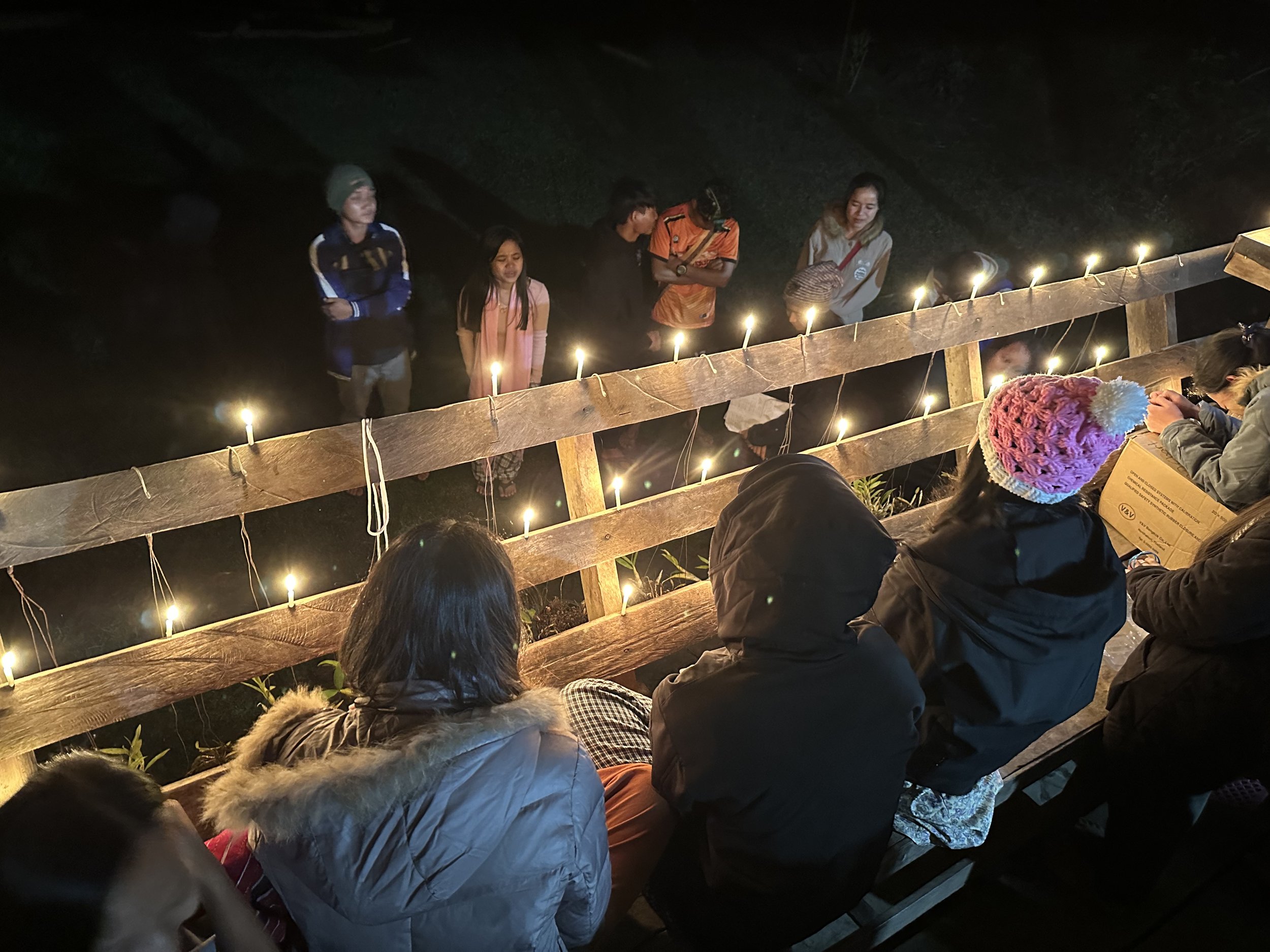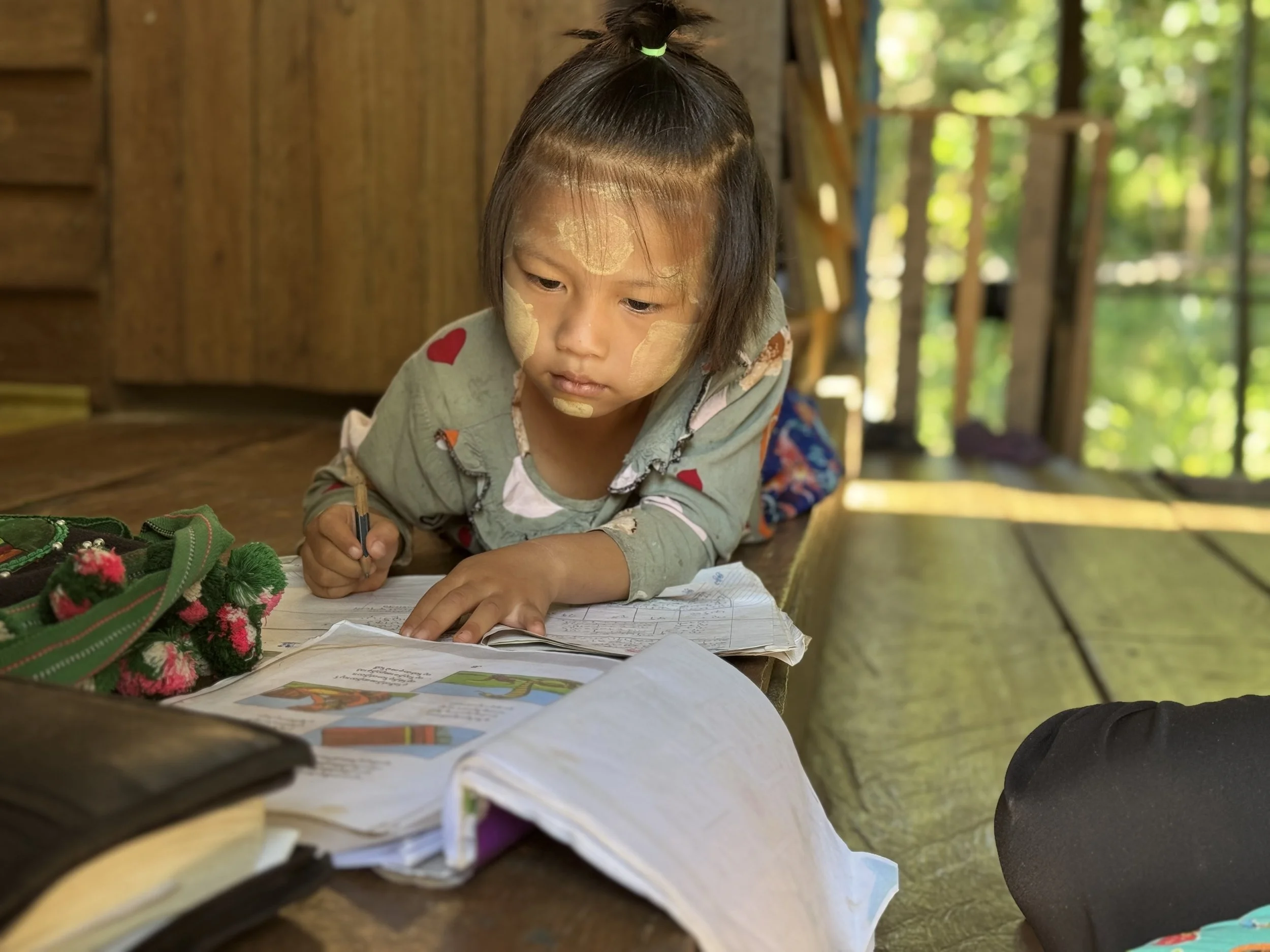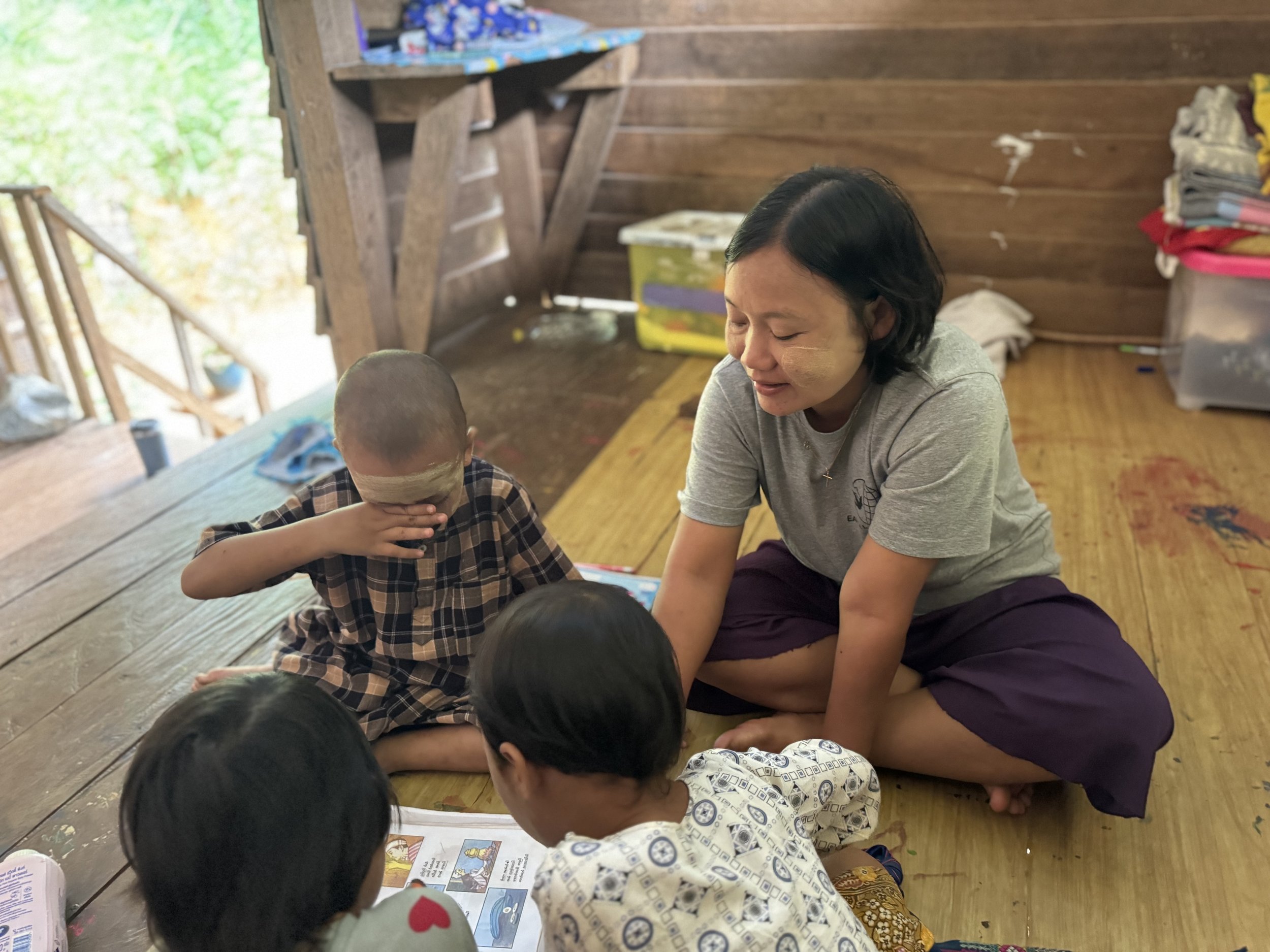A Karen Christmas
TahKer, a 39-year-old Karen mother of two and staff member at Rain Tree Clinic (RTC), is a deeply spiritual person who feels at home even in places far beyond most of our comfort zones—including my own. I had the privilege of speaking with her about Karen Christmas traditions and the experiences that have shaped her faith.
TahKer, the second youngest of ten siblings, described growing up in a small village on the plains of Burma. Her father was a well-traveled Karen soldier in his youth. Later, he married and eventually became the headman of their village. Her mother, educated in a small missionary school, worked tirelessly to care for their large family. Every year they took part in a very simple but deeply meaningful Christmas service centered around the small church in their village. As she told me Christmas stories from her past, her eyes filled with tears— a mixture of joy, nostalgia, and a lifetime of living with war. For as long as she can remember, the Burma Army waged war against the Karen people. Yet even in the most difficult times, her family and village found ways to celebrate Christmas.
In the Karen tradition, Christmas is more than a single-day celebration. Festivities fill the entire month of December and are joyously shared with neighboring communities. Villages take turns hosting celebrations throughout the month. Hospitality is a valued practice for the Karen and a source of pride for the village. With their reputation on the line, villagers put serious effort into planning and preparation for the special day.
In the days leading up to Christmas, TahKer’s village buzzed with activity. Children gathered hay to place outside the church for people to sit on, while others cut and decorated a Christmas tree to display inside the church. Children made paper chains from plain white paper, fastening the links together with homemade sticky rice glue.
For the Karen, music reflects the heart of the season. There was no electricity and no “sound boxes” at this time. Instead, groups practiced their songs for days, filling the fields and jungle with voices that carried for miles.
Food was another cornerstone of the festivities. Families prepared sticky rice snacks wrapped in banana leaves. Often, they mixed in some sesame seeds for a little extra flavor. Many added sugarcane, though this wasn’t always a popular choice with the children. The children’s favorite? Sticky rice with refined sugar—a rare and precious treat.
Christmas Day began early. By 6 a.m., the entire village was dressed in their finest clothes, faces glowing with intricate tanaka designs. Mothers and older sisters carefully applied the natural makeup to the younger children, while teenage girls turned their faces into works of art—a romantic tear dangling from the corner of an eye, dashing streaks on the cheeks, mysterious circles. TahKer was too practical to worry much about that, although she did confess to hoping for a tube of red lipstick for her Christmas present.
The first community activity was always a prayer service, followed by hours of singing. Choirs from neighboring villages added to the beauty of the celebration. Then the pastor would tell the story of Jesus’ birth. Often a village newborn was placed in a special basket during the service, a living reminder of the mystery of God incarnate.
Next came the meal. The men of the village had spent the previous night cooking over wood fires, boiling curries, preparing soups with pork or chicken, and making spicy sauces. Mouthwatering aromas filled the village. If especially lucky, sweet, red watermelon provided the perfect end to a special meal.
After eating, the games began. Wheelbarrow races. Leap frog. Soccer games. Children as well as adults competed for prizes. Everyone screamed with laughter at the site of the older normally more reserved and dignified elders tripping and tumbling on the field with everyone else. Laughing, TahKer recalled how badly she wanted a first prize: a bar of yellow soap.
The day ended with an evening of village entertainment. By the flickering light of oil lamps, families watched Christmas plays or listened to more singing. One year, TahKer was the star of a play about PoKay.
PoKay was an orphan boy. A simple, kindhearted teenager who was very good at everything he did. Because he was poor, however, no one paid him much attention. Meanwhile, the King of the land wanted to marry off his daughter, but he had a problem. His daughter didn’t want to speak to anyone. Having tried without success to find her a husband, at last the King made a public decree that he would give his daughter in marriage to any boy who could just get his daughter to talk. Enter PoKay.
PoKay talked to the King's daughter while she cooked rice. PoKay told her he couldn’t find his clothes and made a big pretense of looking everywhere for them. (TahKer said this part was quite funny). PoKay asked a second time, “Where are my clothes?” Finally, the King's daughter couldn’t stand it any longer. “The clothes are right there, right behind your back,” she blurted out. PoKay had been hiding them from her the whole time. (My wife Caryl does this to me all the time too… “It’s right there in front of you.") The King, clearly impressed with PoKay's conversational skills, allowed them to get married. Karen stories, according to TahKer, like to end on a good note.
Not all Christmas memories, however, were joyful. A few years after her PoKay performance, the girl who played the King’s daughter died of malaria. She was 14—a reminder of how fragile life was in the village. And the war was never far from their minds or their lives. Under one pretext or another, the Burma Army forced all the people in TahKer’s village to move several times to special “camps.” While they were gone, the soldiers ransacked their homes, taking whatever they wanted and destroying the rest. Displaced from their houses and farms for months to years, the villagers were still expected to feed themselves. Each day, they walked an hour or two to their fields, worked all day, and returned before evening.
This time was especially hard for TahKer’s father, as he was the headman of the village. Although he just wanted peace for his village, the Burma Army soldiers took out any suspicions on him and beat him often. Nevertheless, even during these difficult years, TahKer’s father would lead the village to celebrate Christmas. Even when apart from their homes. Even when they were all exhausted, sad and unsure of their future.
I asked TahKer why he insisted on doing that. She simply answered, “Because he loved Jesus.” For TahKer, and her father, Christmas wasn’t a matter of having a celebration for the fun of it, but it was their loving response to Jesus.
Now it is Christmas season again, and TahKer and her family have once more been forced to leave their home in LerDoh. This time they have joined us at RTC, only now she is the mother and the wife.
“Now it is a difficult time. Sometimes I’m very worried about the future, especially for my children’s education. What should I do? Then I pray, “Give us our daily bread” and remind myself I don’t need to worry about tomorrow. I want to tell people who aren’t Christians about Jesus’ story. If you believe Jesus, you will go to a good place. A place not like this. But if you do not believe, you cannot come with me. Even though people like the Burma Army soldiers are different, I am Jesus’ daughter and because He loves them, I can love them too. Even though it is a difficult time now, if we know Jesus, we can have joy all the time because one day we know he will prepare a place for us—a place that will feel like my old village—a place that is your heart’s home.”






